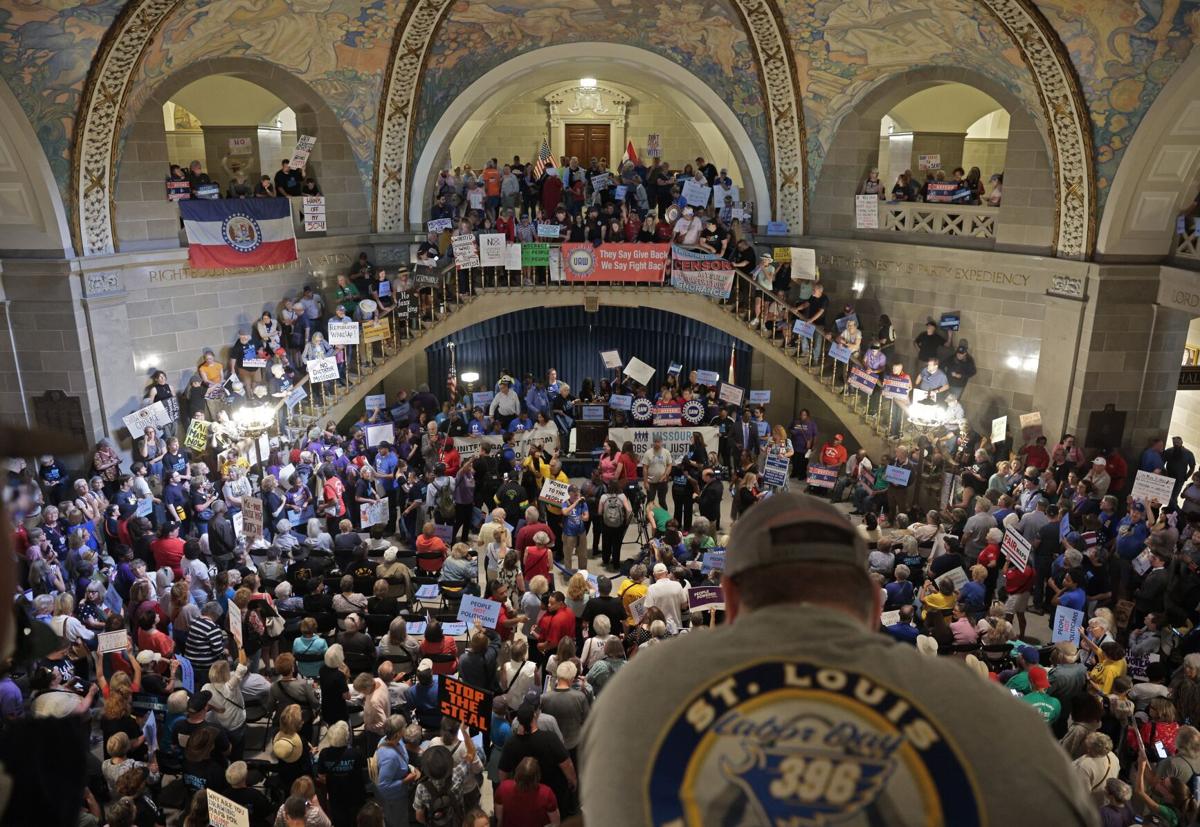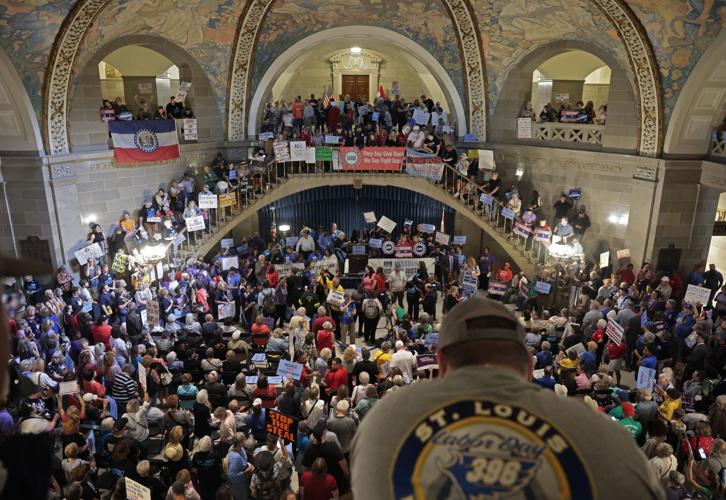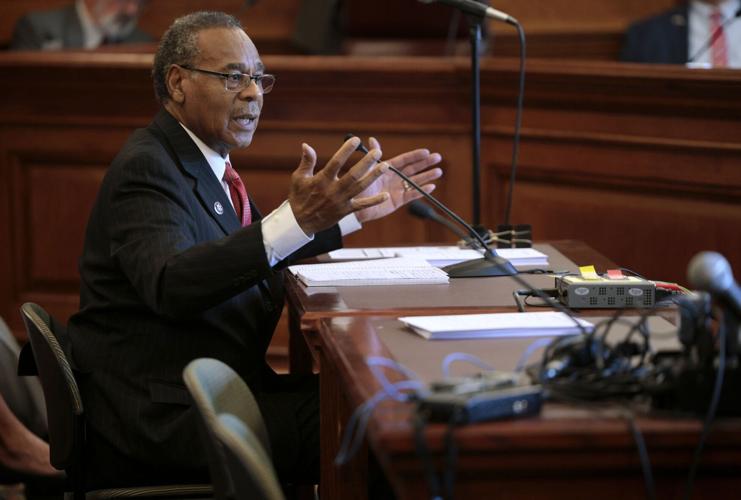JEFFERSON CITY ŌĆö Three years ago, hardline members in the Senate Republican supermajority demanded the redrawing of MissouriŌĆÖs congressional districts to flip one of the last two Democratic seats to the GOP.
Party leaders derided them and foolish. Colleagues and pundits branded them as grandstanders. The proposal was by a bipartisan majority.
This past week, the hardliners got their way. Urged on by President Donald Trump, nearly every Republican senator voted to gerrymander a new GOP seat. Then they rammed through a plan asking voters to severely limit citizensŌĆÖ ability to change the state constitution by gathering signatures on a petition. To do it: They cut off debate in the Senate, something long considered sacred, for the fourth time on a bill this year, the most in more than a decade.
People are also reading…
For the chamberŌĆÖs old renegades, it was vindication ŌĆö and a hopeful sign of things to come.
ŌĆ£Here we are, three years later,ŌĆØ former Sen. Bill Eigel told the Post-Dispatch. ŌĆ£Donald Trump is able to get the moderates in the Missouri Senate to act like Republicans.ŌĆØ
ŌĆ£The Senate,ŌĆØ he said, ŌĆ£is experiencing some big changes.ŌĆØ
Altogether, the actions taken in the past week could be a body blow to Democrats in Missouri. If the new maps survive a lawsuit and a referendum push, the Democratic delegation to Congress will almost certainly be cut in half. The changes to the initiative petition process could cripple liberalsŌĆÖ ability to go around the Legislature and enact their policies via the ballot box. And if Republicans continue to aggressively limit the filibuster, statehouse Democrats will be hard pressed to shape any policy.
Mainline Republicans downplayed the moves this past week. They said Eigel was wrong, and cast the new policies as things they had wanted all along. The new maps, they said, were the right thing to do for a conservative state. The changes to the citizen petition process, they said, would keep out-of-state liberal interests from imposing their will on Missourians.
ŌĆ£We got things done because we were able to work with our caucus, because we donŌĆÖt have Bill Eigel,ŌĆØ said Senate President Pro Tem Cindy OŌĆÖLoughlin, R-Shelbina.

Missouri state Sen. Cindy OŌĆÖLaughlin, R-Shelbina, listens during debate from her seat on the Senate floor on Wednesday Sept. 10, 2025, at the Missouri Capitol in Jefferson City.
ŌĆ£EigelŌĆÖs having trouble with the truth again,ŌĆØ said Sen. Mike Cierpiot, R-LeeŌĆÖs Summit.
Democrats, however, saw the same thing Eigel did.
ŌĆ£This session happened because Republicans are scared,ŌĆØ said Sen. Doug Beck, D-Affton. ŌĆ£They are scared of mean tweets from Donald Trump.ŌĆØ
ŌĆ£ItŌĆÖs just shocking,ŌĆØ said Sen. Stephen Webber, D-Columbia.
It wasnŌĆÖt like this in 2022, when lawmakers returned to Jefferson City. Senate Republicans were fractious and divided.
The Conservative Caucus, a group of hard-right lawmakers led by Eigel, was wearing thin.
ŌĆśBending over backwards for DemocratsŌĆÖ
The caucus had formed a few years earlier. They had for not moving fast enough on an abortion ban, then filibustered Gov. Mike ParsonŌĆÖs push for subsidies for a big General Motors project. In 2021, the group helped kill a tax bill needed to fund the stateŌĆÖs Medicaid system over concerns about the money funding birth control, forcing Parson to drag lawmakers back for a special session that summer.
When Republican leaders called a meeting later that year to discuss plans for 2022, they refused to invite the hardliners.
A few weeks later, the Senate took up a redistricting bill expected to maintain the status quo ŌĆö that Missouri would send six Republicans and two Democrats to the U.S. House. The caucus objected, urging their colleagues to go with a new map carving up the Kansas City-based 5th District to create another seat for the GOP.
Sen. Rick Brattin, R-Harrisonville, called the 6-2 proposal ŌĆ£atrocious.ŌĆØ Then-Sen. Bob Onder, R-Lake Saint Louis, called it ŌĆ£ŌĆ£ at a Capitol rally.
Republican leaders , saying they had legitimate concerns that a ŌĆ£7-1ŌĆØ map would spread Republican voters too thin and give Democrats a chance to win three seats. OŌĆÖLoughlin, the future Senate leader, told constituents on Facebook she worried that adding urban and suburban voters could eventually overwhelm rural concerns. ŌĆ£I donŌĆÖt want city people with whom we have little in common being drawn into our areas,ŌĆØ she wrote.
But it felt like GOP leaders were just afraid of Democratic filibusters that could hold up other priorities, Eric Burlison, then a state senator and now a U.S. congressman, recalled this week. Republicans had the numbers to cut off debate, but they didnŌĆÖt use them.
ŌĆ£They didnŌĆÖt want to eat up floor time,ŌĆØ Burlison said. ŌĆ£It was always like, ŌĆśWe left this on the table because Republicans were willing to bend over backwards for Democrats.ŌĆÖŌĆØ
Last year, similar divisions returned. Republicans were pushing to change the initiative petition process, to ask voters to make it harder to amend the state constitution.
It was in conservative crosshairs ŌĆö progressive groups had used the process to expand Medicaid and legalize abortion despite GOP opposition.
The caucus wanted to add a provision banning noncitizens from voting, which could make the proposition look better on the ballot. And they had more allies than before.
But Democrats filibustered for hours. Some Republicans cut a deal to keep the noncitizen clause out. When hardliners insisted on bringing it back, the proposition fell apart.

Missouri State.┬ĀSen. Tony Luetkemeyer, R-Parkville appears on the Senate floor on Wednesday, Sept. 10, 2025, at the Missouri capitol in Jefferson City.
ŌĆśThatŌĆÖs what changed everythingŌĆÖ
Then this summer, the White House intervened.
Eager to maintain RepublicansŌĆÖ edge in the U.S. House in midterm elections that have historically gone against the presidentŌĆÖs party, Trump started leaning on red states across the country to redraw their maps to secure seats.
After Texas heeded the call, the presidentŌĆÖs team turned its attention to Missouri, to encourage action. Just before Labor Day, Gov. Mike Kehoe said he would be calling lawmakers into a special session to pass the new maps and put petition restrictions on the ballot.
And when legislators returned this month, they made quick work of the assignment, brushing off protests that filled the Capitol rotunda and an appeal from U.S. Rep. Emanuel Cleaver, the Democrat whose seat is on the chopping block.

U.S. Rep. Emanuel Cleaver addresses a Missouri Senate committee on Thursday, Sept. 11, 2025, during a special session to take up bills by GOP lawmakers that will change Senate rules and enact redistricting laws. Cleaver, who represents a significant portion of Kansas City, stands to lose his seat under the proposed district map.
Some Republicans downplayed the influence of the president, saying the bills before them were things they have supported for years.
But for Burlison, the congressman and former Conservative Caucus member, the president definitely made the new maps happen.
ŌĆ£I think thatŌĆÖs what changed everything,ŌĆØ he said.
And it may have lasting consequences. Sen. Brian Williams, D-University City, said the events of the past week were like nothing heŌĆÖd ever seen before.
ŌĆ£It feels like a new world,ŌĆØ he said.
Eigel, who is running for St. Charles County Executive after exceeding expectations in a bid for governor last year, said he thinks Republicans may turn their special session approach into a habit on what he called ŌĆ£Big RedŌĆØ issues important to the GOP base.
ŌĆ£Because theyŌĆÖve seen that if they donŌĆÖt, they might end up in a special session down the road,ŌĆØ he said.
Katie Kull of the Post-Dispatch contributed to this report.

Missouri State Sen. Nick Schroer, R-Defiance listens during debate on Friday, Sept. 12, 2025, during a special session during which GOP lawmakers passed measures to limit the power of voters to initiate laws and re-draw Missouri's congressional district map to send more Republicans to Washington D.C.

Missouri State Sen. Sen. Jason Bean R-Holcomb, serves behind the dais on Friday, Sept. 12, 2025, during a special session during which GOP lawmakers passed measures to limit the power of voters to initiate laws and re-draw Missouri's congressional district map to send more Republicans to Washington D.C., a move opposed by their caucus.

















